Have you ever tried breaking up with a narcissistic person? If your answer is yes, then you know that breaking up with a narcissist will never be easy, and surviving a narcissist breakup is nothing short of legendary.
In this article, we are going to talk about what happens when you break up with a narcissist and what to expect when you break up with a narcissist.
A break up with a narcissist is incredibly difficult, for many reasons. Your loyalty, compassion, and desire to be true to your promises make it hard for you to consider leaving the relationship.
The narcissist can also make it hard for you to leave because he wants to be in control of the decision to end the relationship. As long as keeping the relationship is the most important factor to you, the narcissist has free rein to dominate you and your decisions.
Caretakers are most likely to leave when the narcissist crosses a line that they finally can’t or won’t tolerate. But over the years, I have found it hard to predict when a caretaker will leave.
The client whose narcissistic husband suffered a stroke and became physically abusive didn’t leave. But the client whose husband moved his pregnant girlfriend into the spare bedroom, saying she was an old friend from a college down on her luck, did file for divorce.
Caretaking men seem less likely to leave than women, perhaps because of the extra burden of responsibility that men culturally feel to take care of women.
When caretakers do leave, they find it difficult to stick with their decision due to feelings of guilt or pity for the narcissist. And if the narcissist doesn’t want you to leave, (s)he’ll keep pressuring you to change your mind, often with those same old promises to change.
The narcissist can make your life extremely arduous in order to keep control of you and the relationship.
Related: 6 Feelings That Sociopaths and Narcissists Leave Behind
Will the narcissist ever be the one to leave?
Sometimes a triggering event will motivate the narcissist to leave. These are usually life-altering events for one of you. If you become ill or incapacitated or unable or unwilling to participate in the life the narcissist has designed, that may prompt the narcissist to leave.
Even a positive event, such as having a child, can upset the delicate balance of the relationship, especially if it requires the narcissist to be more responsible and emotionally involved. Illnesses, aging, and job losses or promotions can act as triggers for the narcissist to suddenly abandon the relationship.
Regardless of who makes the first move to leave, here’s what you can expect at the end of a relationship with a narcissist.
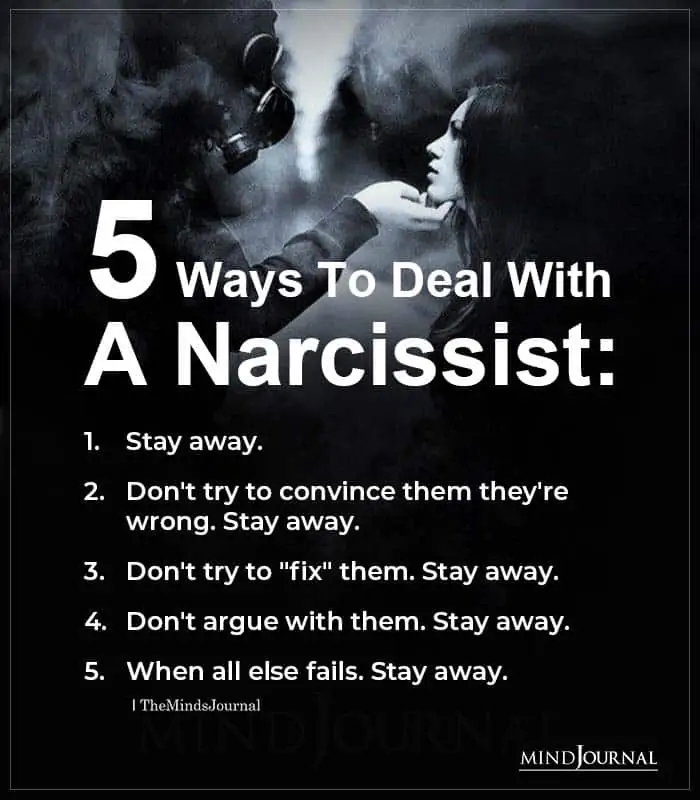
8 Things To Expect When You Break Up With A Narcissist
1. Blame
When things don’t work out, the narcissist puts the blame entirely on someone else. You were on a pedestal at the beginning of the relationship. You were wonderful and perfect, and the narcissist was thrilled to have “won” you as a mate.
Now that the narcissist sees the relationship as broken, damaged, and ending—and it’s all your fault.
(S)he says you’re too fat or too needy or too happy. You have wrecked things, destroyed the trust, ruined the best thing you ever had, crushed his love. You’re unappreciative of all he has done for you. You would be nothing without him/her.
You have single-handedly destroyed all the two of you have built. You’re selfish and demanding. Overnight you have become the most despised person in the narcissist’s life.
Obviously, that is shocking, hurtful, insulting, and thoroughly unfair and wrong. When the narcissist reaches this point, (s)he will no longer listen to you or give you any consideration and may no longer be willing to even speak to you.
If you apologize profusely enough and beg for reconciliation, you may get back together for a while, but things between the two of you will probably never be good again.
2. Attempts to convince you you’ve made a mistake
After months or years of being told you’re wrong and having your decisions devalued by the narcissist, you are probably prone to second-guessing yourself. And the narcissist will certainly try to convince you that you’ve made a mistake.
(S)he tries charisma, coaxing, persuasion, and then intimidation, goading, and outright provocation to get back in control of the relationship.
The narcissist will say, “You just misinterpreted what I said. Of course, you should know that deep down I love you; why do I have to say it all the time? What about all the good times we’ve had together? You look at the negative too much. You don’t understand the stress I’ve been under lately. You take things too personally. You’re overreacting. You’re too emotional.”
Although the narcissist tries to sound positive about the relationship and why you shouldn’t leave, you’ll notice that all these “reasons” are actually negative remarks about you and what is wrong with what you’re doing.
These are not real encouragements to stay in the relationship; they are actually manipulations to lower your self-esteem so you won’t break up with the narcissist.
If the coaxing and persuasion don’t work, the narcissist can bring out the especially negative evaluations to trigger your sore spots and make you feel bad about yourself:
“You were nothing before you married me. Go back to that stupid family of yours and rot. You’ll be sorry when I’m out in California and making loads of money. I can find somebody who will really love me and always put me first.”
If the narcissist still needs you, (s)he won’t want you upsetting their plans. Your leaving gives you more emotional strength and power in the relationship by moving you further out of the narcissist’s control, and (s)he doesn’t want that to happen.
Related: To Every Girl Who Has Ever Lost Herself To A Narcissistic Man
3. Attempts to guilt-trip you into staying
Guilt is a powerful tool for the narcissist to pull you back into the relationship when you are trying to break up. The narcissist brings up every time he has done something nice for you or stresses how much he cares about you or reminds you of the wonderful times you’ve had together.
If the positives don’t work to bring you back, narcissists default to their devaluing attacks. Any complaint you have made about the narcissist will be turned around on you. Narcissists consistently blame their partners for behaviors they are actually exhibiting in that very moment—screaming, name-calling, hostility, selfishness, hatred, and passive-aggressiveness, to name a few.
Being told you are selfish, unkind, cruel, greedy, stingy, or hurting someone’s feelings can be especially painful to a caretaker. You work so hard to never do or be those things and almost never even have those kinds of feelings, so you feel deeply wronged.
These comments are such a clear indication that the narcissist doesn’t know you or see you for who you are, and that can be heartbreaking.
These kinds of accusations also increase your feelings of guilt, so you’re more likely to redouble your efforts to prove to the narcissist that you’re not that kind of person. That’s just what the narcissist wants because it reengages you in the relationship.
Once the narcissist has goaded you into reacting, (s)he can keep you feeling powerless, and guilty, and participating in the relationship until (s)he’s ready to end it.
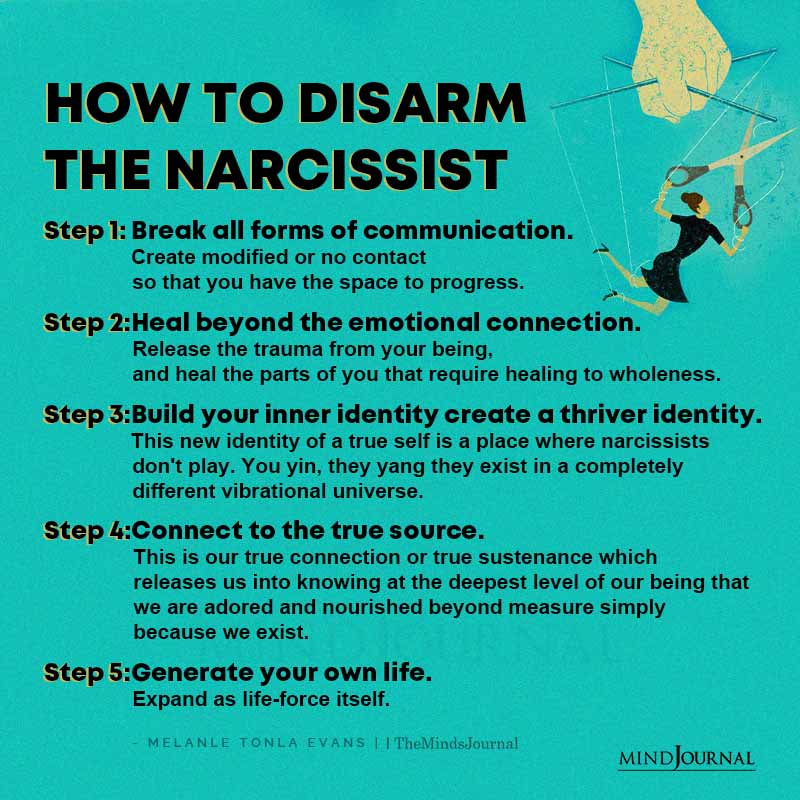
4. Demands for attention, even after you’ve broken up
It is easier to break up with a narcissist and leave him/her if you cut off as much contact as possible. However, narcissists can be extremely persistent in grabbing your attention.
Clients have reported many types of attention-getting behaviors from narcissists who feel rejected, for example, drunk calling in the middle of the night, “accidentally” breaking into your house to get their belongings, hundreds of texts or emails in a day, constant pleas for you to “explain” why you want to leave—all of which lead to the narcissist’s denouncing you for being so negative.
If you have children together, these pleas for attention can go on and on. One client was so anxious from all the pressure that she actually lost her voice when she saw her former husband.
He was so determined to get her attention that he even pressured the court to “order” her to speak to him in public “for the sake of the children.” Of course, it was actually for the sake of his own egotistical need to be acknowledged.
Related: Leaving A Toxic Relationship Is Hard, But These 6 Steps Make It Easier
5. Promises to change
If persuasion, guilt, and attention-getting behaviors don’t pull you back into the relationship, the narcissist pulls out the promise to change. Suddenly the narcissist says (s)he understands why you are upset and ready to break up.
(S)he appears to be taking responsibility for his/her behaviors. (S)he promises to go to therapy, do everything you ask, and do things your way. (S)he is so, so sorry to have hurt you.
This is a tempting appeal for a caretaker who truly wants the relationship to work. Now it seems that the narcissist finally understands what you’ve been saying and is ready to make things right. (S)he seems genuinely sincere. You breathe a sigh of relief and hope builds in you again.
Inevitably this hope disintegrates. Narcissists can’t stop trying to control you, and they can’t seem to control their own behaviors for any length of time. For a while, you think things are getting better.
However, when the narcissist gets comfortable in the relationship again, (s)he’ll go back to being self-absorbed, inconsiderate, arrogant, insensitive, and blaming.
And invariably if things don’t go his/her way, (s)he’s instantly back to the same defensive and antagonistic patterns. How many times you’re willing to believe the narcissist’s false promises is up to you.
6. Social attacks and gossip
It is hard to keep your break up with a narcissist out of the public eye because the narcissist demands that everyone you know choose sides.
As soon as possible (s)he will tell your friends, neighbors, church members, and club acquaintances in person and on social media his/her version of the story of your breakup. That is very distressing for most caretakers.
During your entire relationship, the narcissist insisted on extreme privacy about your interactions together, and now (s)he is spreading all kinds of misinformation and slander and trying to ruin your good name.
Too often caretakers continue to keep their promises not to talk about the relationship, which means the narcissist’s lies stand without challenge.
Gossip is a manipulative tactic designed to make you the bad guy and to garner the narcissist as much sympathy as possible. It can also work effectively to re-engage you with him and bring you under control.
Related: 8 Signs You Are The Victim Of An Abusive “Hoovering” Narcissist
7. Stalking
Although stalking is usually not blatant or threatening by narcissists, it is not uncommon for narcissists to fortuitously be at the grocery store when you are, to suddenly appear at a community or social event you attend, or change their running schedule so they go down your street every morning.
Be prepared ahead of time that these unexpected meetings might occur when you break up with a narcissist. They’re designed to keep you aware of the narcissist’s presence and emotionally off-balance.
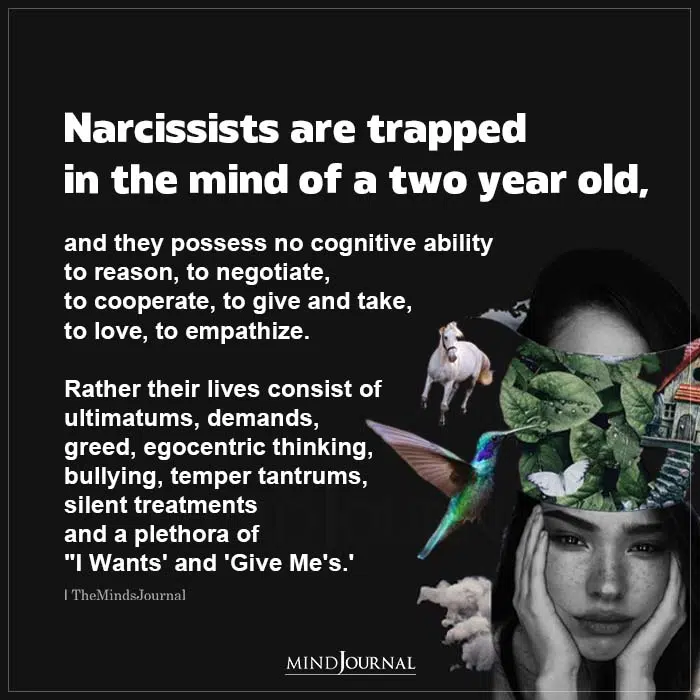
8. Neediness
Narcissists appear to be strong and independent, but they are actually extremely needy. You may find it hard to let go of taking care of the narcissist.
You may get calls to come to fix her car, or he may still expect you to keep doing the accounting for his business, or she wants you to take down the Christmas lights on her house, or he expects you to still make his dentist appointments.
It can be exhausting and difficult for you to say no to these persistent requests. Too often you get pulled back into interactions with the narcissist that really don’t benefit you.
Related: Why It’s So Hard To Forgive Yourself And Trust Again After Toxic Relationship
Did you ever break up with a narcissist and experienced the 8 things mentioned above? Leave your thoughts in the comments.
Want to know more about breaking up with a narcissistic partner? Check this video out below!
Written by Margalis Fjelstad, Ph.D., LMFT
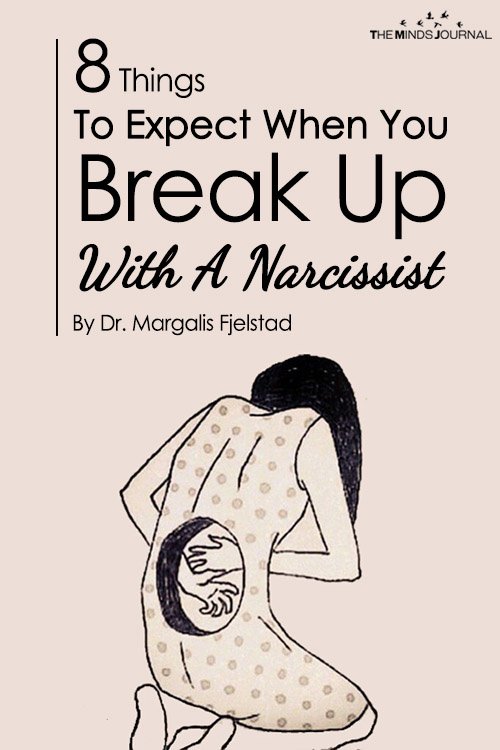


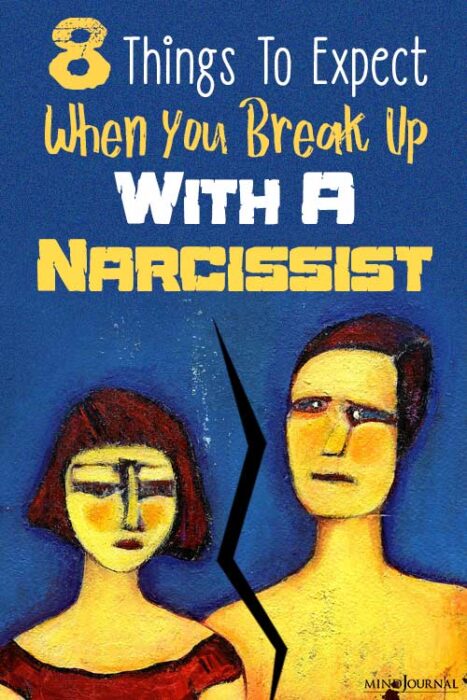








Leave a Reply
You must be logged in to post a comment.